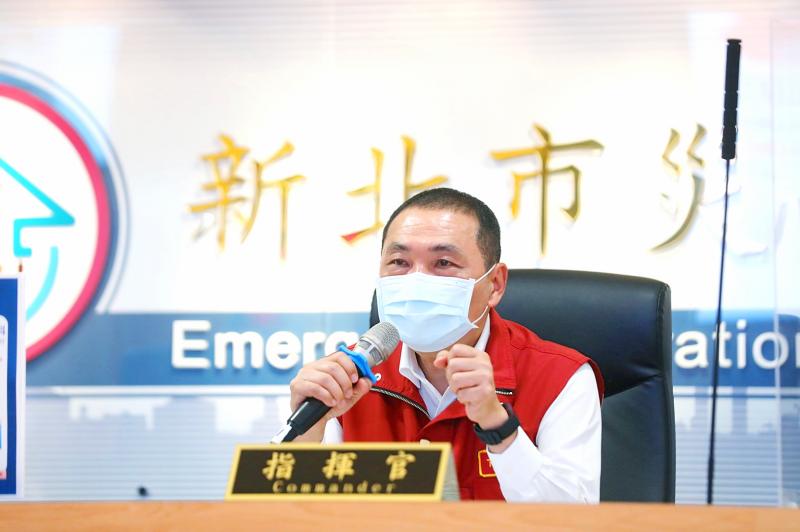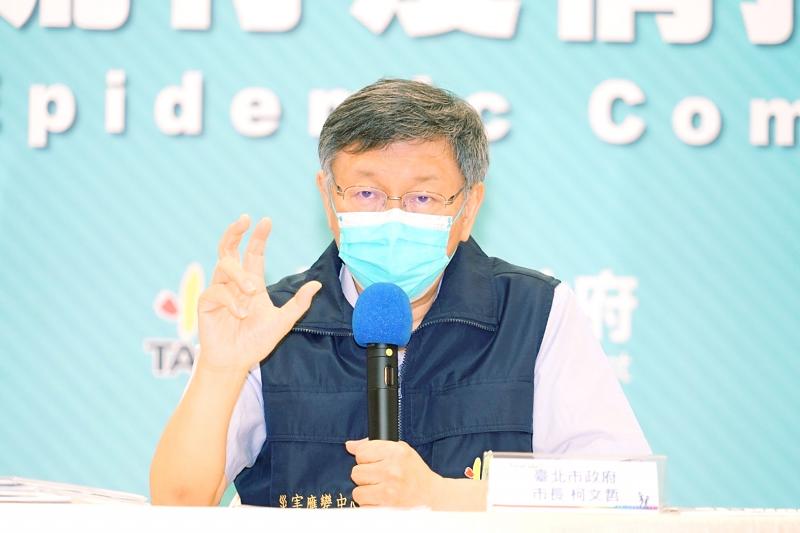Household infections accounted for about 40 percent of the new COVID-19 cases in Taipei and New Taipei City over the past three days, their governments said yesterday, urging people to visit virtually and refrain from going out over the next two weeks.
From April 26 to yesterday, there were 4,217 cases in New Taipei City, with 947 in Banciao (板橋) alone, New Taipei City Mayor Hou You-yi (侯友宜) said, adding that 4,535 people are in home quarantine.
During the period, there were 677 cases in New Taipei City’s Jhonghe District (中和), 500 in Sanchong District (三重), 369 in Sinjhuang District (新莊), 334 in Yonghe District (永和), 320 in Tucheng District (土城), 220 in Sindian District (新店) and 170 in Lujhou District (蘆洲), the city government said.

Photo: Weng Yu-huang, Taipei Times
Pingsi (平溪), Shuangsi (雙溪) and Wulai (烏來) districts, known for their broad mountainous areas, are the only districts in New Taipei City to have reported no cases, data showed.
Hou urged people to stay home and said that enterprises not handling daily necessities should suspend operations.
Asked for clarification, the city government later said that Hou was referring to businesses such as sellers of jewelry, clothes, antiques and works of art; fortune telling services; and those offering leisure activities.

Photo courtesy of the Taipei City Government
Cases and contact tracing numbers were highest on May 14 and May 17, indicating a correlation between the two, Hou said, adding that since hotspot areas were designated on May 22, contact tracing has dwindled to one-fifth of its former number.
However, cases have increased from last week in Yonghe, Tucheng, Lujhou, Jhonghe, Linkou (林口) and Sijhih (汐止) districts, he added.
Of the about 600 cases confirmed in the past three days, 40.07 percent were infected by a relative and 16.38 percent by someone at work, Hou said.
Those infected after visiting Taipei’s Wanhua District (萬華) were down to 5.75 percent, while shopping center infections comprised 5.92 percent, hospital or nursing home infections 3.48 percent, those infected by a friend 2.26 percent and other sources 0.87 percent, he said, adding that many sources of infection were still unknown.
Since May 17, when rapid testing stations were first set up, 25,874 people have been screened, with an average positivity rate of 2.8 percent, Hou said.
With yesterday’s establishment of a high-capacity station in Banciao, the city’s 32 stations can test up to 3,600 people per day, making it possible to find asymptomatic and mild cases hidden within the population, Hou said.
The positivity rate on Tuesday had fallen to 1.8 percent from 2.1 percent the day before, but climbed back to 2.1 percent on Wednesday, he added.
In the capital, the household infection rate was 43 percent, Taipei Mayor Ko Wen-je (柯文哲) said, encouraging people living together to eat in shifts and not to share utensils, as group dining presents the greatest infection risk.
The percentage is so high because previously people would go home to wait for the results of their polymerase chain reaction (PCR) test, but the standard now is to quarantine in a specialized facility after receiving a positive rapid test result, Ko said.
Ko on Wednesday said that the virus had reached every corner of Taipei, but not yet every part of Taiwan.
Without vaccines or a lockdown, what happened in Taipei would happen to all of Taiwan after three weeks, he added.
Ko said that he supports domestic biotechnology companies and vaccine production, but the situation has changed.
There are already approved foreign vaccines available for a reasonable price, he said, adding: “If you can take one, take it. At least get a head start.”
Additional reporting by CNA

Authorities have detained three former Taiwan Semiconductor Manufacturing Co (TMSC, 台積電) employees on suspicion of compromising classified technology used in making 2-nanometer chips, the Taiwan High Prosecutors’ Office said yesterday. Prosecutors are holding a former TSMC engineer surnamed Chen (陳) and two recently sacked TSMC engineers, including one person surnamed Wu (吳) in detention with restricted communication, following an investigation launched on July 25, a statement said. The announcement came a day after Nikkei Asia reported on the technology theft in an exclusive story, saying TSMC had fired two workers for contravening data rules on advanced chipmaking technology. Two-nanometer wafers are the most

Tsunami waves were possible in three areas of Kamchatka in Russia’s Far East, the Russian Ministry for Emergency Services said yesterday after a magnitude 7.0 earthquake hit the nearby Kuril Islands. “The expected wave heights are low, but you must still move away from the shore,” the ministry said on the Telegram messaging app, after the latest seismic activity in the area. However, the Pacific Tsunami Warning System in Hawaii said there was no tsunami warning after the quake. The Russian tsunami alert was later canceled. Overnight, the Krasheninnikov volcano in Kamchatka erupted for the first time in 600 years, Russia’s RIA

CHINA’s BULLYING: The former British prime minister said that he believes ‘Taiwan can and will’ protect its freedom and democracy, as its people are lovers of liberty Former British prime minister Boris Johnson yesterday said Western nations should have the courage to stand with and deepen their economic partnerships with Taiwan in the face of China’s intensified pressure. He made the remarks at the ninth Ketagalan Forum: 2025 Indo-Pacific Security Dialogue hosted by the Ministry of Foreign Affairs and the Prospect Foundation in Taipei. Johnson, who is visiting Taiwan for the first time, said he had seen Taiwan’s coastline on a screen on his indoor bicycle, but wanted to learn more about the nation, including its artificial intelligence (AI) development, the key technology of the 21st century. Calling himself an

South Korea yesterday said that it was removing loudspeakers used to blare K-pop and news reports to North Korea, as the new administration in Seoul tries to ease tensions with its bellicose neighbor. The nations, still technically at war, had already halted propaganda broadcasts along the demilitarized zone, Seoul’s military said in June after the election of South Korean President Lee Jae-myung. It said in June that Pyongyang stopped transmitting bizarre, unsettling noises along the border that had become a major nuisance for South Korean residents, a day after South Korea’s loudspeakers fell silent. “Starting today, the military has begun removing the loudspeakers,”